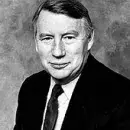
Robert B. W. MacNeil
Until his retirement in October 1995, Robert MacNeil was executive editor and co-anchor of The MacNeil/Lehrer NewsHour, a 20-year nightly partnership with Jim Lehrer on PBS. MacNeil’s 40-year journalism career began with five years at Reuters News Agency in London.
He moved to television in 1960 as an NBC News London-based correspondent, covering such major events as the fighting in the Belgian Congo, the Civil War in Algeria, the construction of the Berlin Wall, and the Cuban Missile Crisis.
In 1963 he was transferred to NBC’s Washington Bureau to report on the unfolding civil rights story and to help cover the White House. MacNeil was the NBC News correspondent covering President Kennedy on the day he was assassinated in Dallas. In 1967, he returned to London to cover American and European politics as a reporter for the British Broadcasting Corporation’s Panorama program.
MacNeil left the BBC in 1971 to be a senior correspondent for PBS, where he first teamed up with Jim Lehrer to co-anchor public television’s Emmy Award-winning coverage of the Senate Watergate Hearings. Their common disenchantment with the style and values of network news programs resulted in the The Robert MacNeil Report with Jim Lehrer. Launched in October 1975, the nightly half-hour series, soon renamed The MacNeil/Lehrer Report, devoted its entire time each night to a single issue. After eight years, and significant impact on broadcast journalism, the program became The MacNeil/Lehrer NewsHour, the nation’s first full hour of evening news. This innovative approach to the news won many awards, including the 1991 International Television Society Broadcaster of the Year Award, two Emmys in 1992, two 1993 American Journalism Review Best in the Business Awards, and the 1994 Radio and Television Correspondents Association Award for congressional reporting.
In February 1999, with Jim Lehrer, MacNeil was inducted into the Television Academy Hall of Fame. MacNeil is the author of several books. The People Machine (1968) studied the relationship between television and politics. He has written three memoirs, including The Right Place at the Right Time (1982) and Wordstruck (1989).